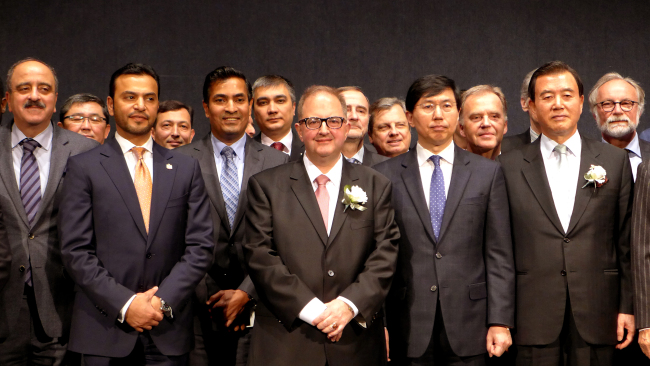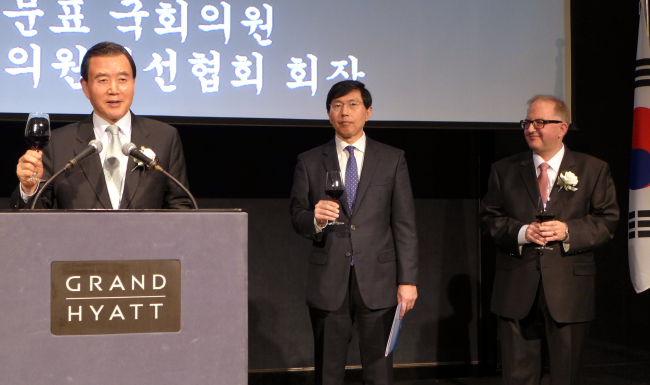The Bulgarian Embassy in Seoul marked the country’s Liberation Day last week amid growing ties with Korea.
The holiday commemorates the Eastern European nation’s independence in 1878 from the Ottoman Empire, which ruled Bulgaria for over 500 years. Bulgaria regained its sovereignty under the Treaty of San Stefano on March 3, 1878, following the Russo-Turkish War of 1877-78.
“Following his election last November, Bulgarian President Rumen Radev is committed to further enhancing our Comprehensive and Future-Oriented Partnership both bilaterally and within the European Union-Republic of Korea Strategic Partnership Framework,” Bulgarian Ambassador to Korea Petar Andonov said at a reception at Grand Hyatt Seoul on March 7.
 |
Bulgarian Ambassador to Korea Petar Andonov (center) and other foreign envoys pose at the Bulgarian National Day reception in Seoul on March 7. (Joel Lee/The Korea Herald) |
Former Bulgarian President Rosen Plevneliev visited Korea in May 2015 for a summit, broadening the scope of cooperation in energy, information communications infrastructure, defense, agriculture and the environment. Foreign Minister Yun Byung-se became Korea’s first top envoy to visit Bulgaria in June last year, and sought ways to strengthen the comprehensive partnership.
Both sides also hashed over options to stop North Korea’s nuclear and missile program.
“Bulgaria calls upon the Democratic People’s Republic of Korea to abandon its nuclear and ballistic missile programs in a complete, verifiable and irreversible manner, and engage with the international community for a credible and meaningful dialogue through the Six-Party Talks,” Andonov said, using the formal name of North Korea.
Bulgaria’s Imagga Technologies -- a startup in Central and Eastern Europe that specializes in cloud-based proprietary image recognition technology -- finished fourth in the K-Startup Grand Challenge last year.
The embassy became a partner of the Jungnang-gu district in Seoul for the Seoul Rose Festival last year, and signed a memorandum of understanding covering culture, sports and the arts. Bulgaria produces high-quality rose oils and has a 35 percent global market share. In the Valley of Roses in central Bulgaria oil-producing roses are harvested based on the region’s unique climate and planting methods.
 |
(From left) Rep. Hong Moon-pyo, chairman of Korea-Bulgaria Parliamentary Friendship Association, Cho June-hyuck, spokesperson for the Ministry of Foreign Affairs, and Bulgarian Ambassador to Korea Petar Andonov (Joel Lee/The Korea Herald) |
Bulgarian rock ’n’ roll band Tube Hedzzz visited Korea in October last year through the Korea Foundation and performed at various festivals in Seoul, Pyeongtaek and Jeju Island.
“Bulgaria went through a difficult transformation from communism and joined NATO in 2004 and EU in 2007,” said Cho June-hyuck, spokesperson and deputy minister for public relations at the Ministry of Foreign Affairs.
Sofia and Seoul established diplomatic ties in 1990. “Since both Bulgaria and Korea are situated strategically in Europe and Asia, there is still great potential for cooperation in various fields,” Cho said, adding the EU-Korea free trade agreement has diversified commerce and bolstered collaboration in infrastructure, agriculture and renewable energy.
By Joel Lee (
joel@heraldcorp.com)









